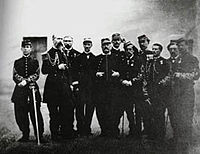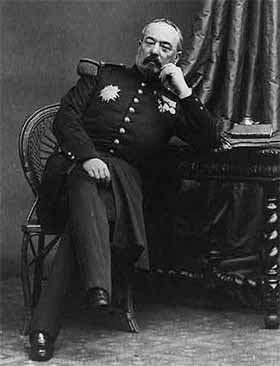François Achille Bazaine : Traitor to the Fatherland ?

Glorious soldier capitulating shamefully without fighting in Metz, is Bazaine a marshal who remained loyal to Napoleon III, a felon passed in the pay of the Germans, or an expiatory victim of the debacle?
On October 6, 1873, the trial of "marshal-traitor" Bazaine began in Trianon. For public opinion, he is largely responsible for the defeat to the Prussians, he who allowed himself to be locked in the citadel of Metz with 100,000 men without trying to get out, and who capitulated without even fighting. For Gambetta, he is the soldier who will pay for all these officers whose cowardice and criminal incompetence have ruined France. After two months of hearing, François Achille Bazaine is condemned to death with military degradation by a council of war which hastens to ask for his pardon from the President of the Republic. But what do we really accuse this military man of, rank-and-file soldier turned marshal?
Poor soldier ... or ambitious schemer?

When in 1870 General Leboeuf declared that "the army is not missing a gaiter button", it is a badly prepared French army that is about to go to war against Prussia. And in fact, the setbacks multiply, leading to the capitulation of Sedan. But the war is not over, for in Paris the Republic is proclaimed, and the latter, like Léon Gambetta, is determined to continue the fight. All hopes are therefore based on the "glorious Bazaine", locked up in Metz with his army.
The latter, however, has fought a calamitous war until then. Commander of the 3rd Army Corps, he made a mistake on August 6 by ignoring General Frossard's requests for reinforcement, whom he allowed to be crushed. The defeat of Forbach-Spicheren brings about the collapse of an army from which most of the soldiers did not fire a gun. Despite this negligence, he was promoted on August 12 to Commander-in-Chief of the Army of the Rhine. At the head of 180,000 men, 40,000 horses and 500 pieces of artillery, Bazaine had three routes to fall back towards Verdun, but he only retained one, that of Gravelotte, bogging down his army for 25 km and turning into an indescribable mess what should have been a tidy retreat. The marshal maneuvered so well that he found himself surrounded in Metz with his army on August 19 ... Unresolved, he will not try anything to make his junction with the army of MacMahon, who is caught in Sedan.
It was in Metz that Bazaine learned of the downfall of the Empire, and the appointment of a national defense government, charged with Gambetta with decreeing the levy en masse to save the Republic. The reference to the 1792 state of mind revolts this soldier, who refuses to recognize the new regime, this "criminal madness". The Republic seems to him a much worse enemy than the Prussian. Dark negotiations began with Bismarck's staff, Bazaine cherishing the hope of restoring imperial power in Paris. In fact, the Prussian staff understood so well its intellectual mediocrity, its lack of political legitimacy and its military incompetence, that it maintains it in the illusion of a negotiation ... while awaiting the surrender of the main french army who is exhausted in the mud and the cold around Metz. When Bazaine finally understood, after three months of siege, that any negotiation preserving his interests was illusory, he capitulated on October 27, 1870.
A traitor sold to the enemy?
To the Duke of Aumale who presides over the council of war and questions him about these negotiations with the enemy carried out to the detriment of his military duties, Bazaine declares: "Yes, I fully admit that these duties are strict when there is a legal government, when one comes under a power recognized by the country, but not when one is faced with an insurrectionary power. "Faithful to the Empire, then, but a traitor to the Republic? Public opinion has already ruled, and rumors are rife. Bazaine is said to have collected enemy money to lay down his arms. Worse: many officers would be accomplices, as proof is his too easy escape, in 1874, from his prison at the fort of Île Sainte-Marguerite.
A posthumous infamy
A scapegoat expiating the negligence of command, Bazaine enjoyed the sad privilege of seeing his name substantivized, which will long remain synonymous with felony. School books set the tone: “Alas! Bazaine's betrayal ended its execrable work. Without having fought, the traitor delivered Metz to the enemy! By ruining the Fatherland, the wretched man rendered useless the daring efforts of national defense. In the schoolyards, people brag about knowing "the man who was going to kill Bazaine." In 1898, Charles Baïhaut, former minister and the only member of Parliament imprisoned after the resounding scandal in Panama, told his newspaper: "I was no longer me, I was ... Bazaine. - Yes, Bazaine: the most base, the traitor to his country. Passers-by were throwing names at me, kids stones. "After the Liberation, the Communists will associate him again with Pétain, another marshal, as for de Gaulle, he will hardly be more tender in stigmatizing in Bazaine "the will of inertia and the sly incapacity".









































































































































































































































































































































